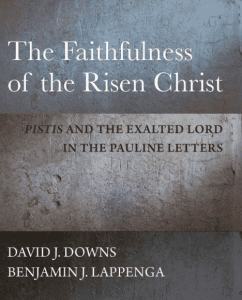 In their new book David Downs and Benjamin Lappenga absorb a now common conclusion — that pistis Christou means “the faithfulness of Christ” and not “faith in Christ” — but develop a fresh angle on what the faithfulness of Christ referred/refers to. Their book is called The Faithfulness of the Risen Christ: Pistis and the Exalted Lord in the Pauline Letters.
In their new book David Downs and Benjamin Lappenga absorb a now common conclusion — that pistis Christou means “the faithfulness of Christ” and not “faith in Christ” — but develop a fresh angle on what the faithfulness of Christ referred/refers to. Their book is called The Faithfulness of the Risen Christ: Pistis and the Exalted Lord in the Pauline Letters.
While there is nothing distinctively new about pistis in this study there is plenty of contribution in this: the faithfulness of Christ does not refer just to his life and especially his death, but his entire life and death and especially his resurrection and exaltation and continual faithfulness. This larger referent to the substance of the faithfulness may well make this book a permanent contribution to Pauline studies.
One here has nothing less than a resurrectional angle on pistis Christou. They know the scholarly focus and consensus:
If there is one point upon which almost all participants in the debate agree, it is that if Paul did employ the construction pistis Christou to refer to an action or attribute of Jesus Christ himself, then Christ’s pistis is demonstrated in his suffering and death on the cross.
Their thesis:
The central claim of this book, however, is that when Paul writes of Christ’s pistis, he is referring also to the faithfulness of the risen and exalted Christ.
Our argument, in short, is that the Pauline expression pistis Christou and related variants refer primarily to the faithfulness of the risen Christ Jesus who will remain faithful to those who, in their own faith, are justified through union with Christ, raised and exalted.
Contrary to the scholarly posture, they begin with 2 Timothy, for many not written by Paul. They do not contend for a specific date or even if Paul was or was not the author but they show the term here refers to the very thing many doubt/wonder if it is present in the NT: the faithfulness of Jesus (subjective genitive theory).
The connection between salvation and Christ’s faithfulness in 2 Tim 2:13 articulates in clear terms the very concept that advocates of the subjective genitive claim to find embedded in the phrase pistis Christou in the undisputed letters: Christos is pistos, and Christ’s faithfulness stands in contrast (at least potentially) with human apistia.
Following a method chapter that affirms monosemy and not polysemy, they proceed through the letters of Paul on pistis and seek not only show that it often refers to the faithfulness of Christ but their larger concern is to show it is about the exalted Christ’s ongoing faithfulness.
Their conclusion:
The story of Christ’s faithfulness in Paul’s letters, which is evoked in the phrase pistis Christou, does not end with Jesus’ death. Instead, we have attempted to show that Christ’s pistis in the Pauline epistles refers also, and in some cases primarily, to the continuing faithfulness of the risen and exalted Christ toward those who are united to him by pistis. In the Pauline epistles, as in wider cultural discourse of which these writings are a part, pistis is relational language, “centering on trust, trustworthiness, faithfulness, and good faith.” The phrase pistis Christou evokes the story of Christ’s own pistis, but it does so in a way that also highlights human participation in Christ’s pistis. It is Christ’s faithfulness toward humanity—the abiding, justifying, mission-empowering trustworthiness of the risen and exalted Lord for those united to him—that allows humans to place their trust in him.











